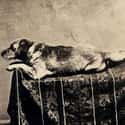-
(#2) Abraham Lincoln
- US President
The name "Fido" for a dog may have been popularized by Abraham Lincoln, but the President's canine by that name met a tragic fate similar to that of his owner. With a moniker that means "fidelity" in Latin, Fido was a yellow-haired mutt the Lincoln family took in about 1855.
Fido was a companion to Lincoln in Springfield, IL, but remained in the Midwest when the Lincoln family went to Washington, DC. Carpenter John Eddy Roll watched Fido during that time, and according to a letter he sent Lincoln in 1862, the dog was "doing well."
The faithful canine attended Lincoln's April 1865 funeral in Springfield and spent the rest of his days there. His life was cut short at some point in 1866:
One day the dog, in a playful manner, put his dirty paws upon a drunken man sitting on the street curbing [who] in his drunken rage, thrust a knife into the body of poor old Fido... So Fido, just a poor yellow dog, met the same fate as his illustrious master - assassination.
The drunken man was Charlie Planck, and in the immediate aftermath of the event, Fido went behind a nearby church, where the Rolls found him. They carried him home, buried him, and covered his grave with flowers.
-
(#1) An 'I've Got A Secret' Contestant Witnessed The Assassination Of Abraham Lincoln
Born in 1860, Samuel J. Seymour of Maryland was a guest on I've Got a Secret in 1956 at the age of 96, when he told the panel and audience that he witnessed the assassination of President Abraham Lincoln.
In 1865, at the age of 5, Seymour, his nurse Sarah Cook, and his godmother Mrs. George S. Goldsborough went to see Our American Cousin at Ford's Theatre. He recalled sitting in balcony seats across from the Presidential Box when he witnessed John Wilkes Booth leap from the box, and President Lincoln fall over.
Seymour was one of around 1,500 people present during Lincoln's assassination.
-
(#8) Squirrels Can't Die From Falling
Many squirrel species are tree dwellers, so it's easy to assume that falling from their high-branched abodes would be an inherent danger. However, the fluffy-tailed rodents, which usually weigh from 1 to 1 ½ pounds, are genetically designed to survive an unexpected plunge toward the earth - no matter the elevation.
Squirrels are small and light, and their stretchy bodies and bushy tails create a significant drag in the air, allowing them to glide (to a degree) before they safely land on the ground after a leap or fall. Because squirrels reach a low terminal velocity after just a few seconds and maintain the fall speed regardless of their initial height, they can safely drop out of the stratosphere or a local oak tree at roughly the same rate.
-
(#12) Gin and tonic
- Beverage
Malaria in colonial India was a major problem for British citizens and soldiers and, as a result, they relied on quinine to combat the disease. Derived from the bark of the cinchona tree, quinine was popular with European settlers in South America during the 17th century as an anti-fever drug. In colonial India, it was again used for fevers, and due to its bitterness, was usually mixed with soda water and sugar.
The bubbly beverage soon became a new drink - tonic water; the first patents for it appeared as early as 1858. Schweppes tonic water entered the market in 1870 as "Indian Quinine Tonic" and was mixed with alcohol, namely gin.
The addition of gin to quinine and tonic water had been taking place for decades by the time commercial concoctions came on the scene. In British India, a daily gin and tonic was essential to maintaining imperial control. Part medicinal and part social, imbibing these cocktails became part of life for British expatriates. When they returned to England or ventured to other parts of the world, gin-and-tonic drinkers took their affinity for the beverage with them.
-
(#14) A 97-Year-Old Former Nazi Secretary Was Convicted For Her Role In 10,000 Murders During WWII
In late 2022, 97-year-old Irmgard Furchner received a criminal conviction for her role as a secretary at the Stutthof concentration camp during World War II. Prosecutors alleged she was an accessory to the murder of 10,505 people at Stutthof, where she “aided and abetted those in charge of the camp in the systematic killing of those imprisoned there between June 1943 and April 1945 in her function as a stenographer and typist in the camp commandant’s office.”
The Washington Post notes that Furchner was tried in a juvenile court, since she was 18 and 19 when she worked at the camp. The nonagenarian received a two-year suspended sentence.
Though nicknamed "the secretary of evil," Furchner has claimed that she did not know the details of what occurred at the concentration camp. “I’m sorry for what happened, and I regret that I was at Stutthof at the time,” she said in her closing statement. “I can’t say any more.”
During the trial, prosecutor Maxi Wantzen argued that Furchner could not have been ignorant of what was happening at Stutthof. “If the defendant looked out of the window, she could see the new prisoners who were being selected,” he said. “Nobody could miss the smoke from the crematorium or not notice the smell of burned corpses.”
According to the United States Holocaust Memorial Museum, more than 60,000 people perished at Stutthof during the war.
-
(#3) Surgical Gloves Were Invented For Love, Not Hygiene
When renowned surgeon William Stewart Halsted first asked the Goodyear Rubber Company to make a thin pair of rubber gloves in the winter of 1889-1890, he had no intention of using them to protect his patients against infection. Instead, he only wanted to protect his love interest's gentle hands from the harsh chemicals she was exposed to as his assistant in the operating room.
Despite being one of America's most prominent advocates for Joseph Lister's antiseptic surgical protocols, the John Hopkins doctor saw little advantage to wearing rubber gloves beyond protecting his nurse Caroline Hampton's skin from mercuric chloride. She evidently appreciated the gesture, because the two were quickly engaged and married shortly after Halsted presented her with his invention.
While the gloves grew in popularity among surgeons for their ability to protect their own skin, it wasn't until much later that they were recognized for their hygienic properties during operations.
New Random Displays Display All By Ranking
About This Tool
Our data comes from Ranker, If you want to participate in the ranking of items displayed on this page, please click here.






